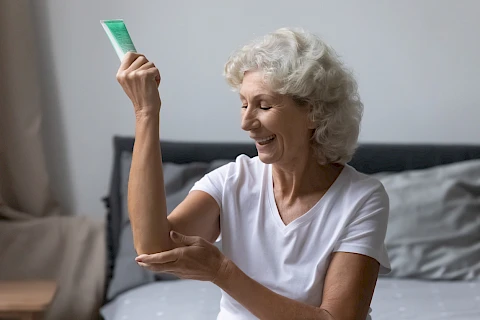
As the winter months approach and the wind begins to bite, many seniors notice their skin feeling drier and more delicate. The cold wind often brings a drop in temperature and humidity, which can be particularly harsh on senior skin. Understanding the reasons behind this can be crucial for maintaining healthy skin during the colder months.
Senior Skin
Senior skin undergoes several changes that affect its structure and function. These changes can make it more susceptible to environmental factors like harsh winds. Senior skin often becomes thinner, losing some of its protective fatty layers. This thinning can lead to a reduction in elasticity and a slower rate of cell regeneration.
Common skin issues seniors face include dryness, itching, and an increased likelihood of bruising or tearing. The reduced production of natural oils in aging skin contributes significantly to these issues. Without these oils, the skin loses moisture more easily and becomes less able to protect itself from environmental stressors.
The Impact of Cold Wind on Senior Skin
Cold wind can strip the skin of its natural moisture, leading to dryness and chapping. This effect is even more pronounced in seniors with lower skin moisture levels. With age, oil glands produce less sebum, the skin's natural oil that helps keep it lubricated and protected. Reduced oil production means senior skin can't lock in moisture as effectively, leaving it dry and more prone to cracking and irritation.
Weather Conditions and Their Effects
Cold temperatures and wind can work together to exacerbate skin dryness. Wind can sweep away moisture from the skin's surface, while low temperatures slow down the production of the oils that help keep skin soft and smooth. Humidity levels also affect skin health. The air becomes much drier during winter, further drying out the skin. This is particularly true in places like Stillwater and the surrounding areas, where winter weather can be harsh and unpredictable.
Preventative Measures for Skin Protection
Focus on moisturizing and hydration to protect your skin from the harsh effects of cold wind. A good-quality moisturizer can help replenish the skin's moisture barrier, making it more resilient against wind and cold.
Here are some lifestyle tips for maintaining skin health in cold weather:
- Stay hydrated by drinking plenty of water
- Use a humidifier indoors to add moisture to the air
- Wear protective clothing like gloves and scarves when outside
- Limit hot showers or baths, which can further dry out the skin
- Apply moisturizer immediately after bathing while the skin is still damp
- Use gentle, fragrance-free cleansers to avoid irritating sensitive skin
- Consider using a lip balm to protect lips from chapping
Senior Helpers Stillwater Can Help Seniors With Skin Care
Seniors are more affected by cold wind due to the natural changes in their skin that come with aging. However, by understanding the factors at play and taking proactive steps in skincare, seniors can maintain healthy, comfortable skin throughout the winter. Encourage seniors to adopt simple yet effective skincare routines. Contact Senior Helpers Stillwater if you're looking for personalized senior care solutions to help navigate these challenges. They offer dedicated support across Stillwater, Bayport, North St. Paul, and Scandia, ensuring seniors can enjoy life with confidence, no matter the season.